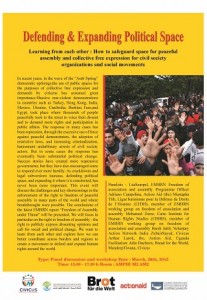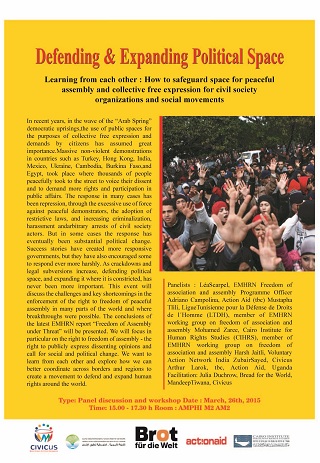 On 26 March, as part of the World Social Forum in Tunis, the Cairo Institute for Human Right Studies along with Bread for the World, the Euro-Mediterranean Human Rights Network, Civicus, and Action Aid, took part in an open panel discussion titled “Defending and Expanding Political Space.” Participants in the panel included Mohamed Zaree, the director of the CIHRS Cairo office; Lea Scarpel, the program officer for freedom of association and peaceful assembly at EMHRN; Adriano Campolina and Arthur Larok with Action Aid; and Mustapha Tlili with the Tunisian League for the Defense of Human Rights. Julia Duchrow with Bread for the World and Tur Weidenfeld with Civicus moderated the discussion.
On 26 March, as part of the World Social Forum in Tunis, the Cairo Institute for Human Right Studies along with Bread for the World, the Euro-Mediterranean Human Rights Network, Civicus, and Action Aid, took part in an open panel discussion titled “Defending and Expanding Political Space.” Participants in the panel included Mohamed Zaree, the director of the CIHRS Cairo office; Lea Scarpel, the program officer for freedom of association and peaceful assembly at EMHRN; Adriano Campolina and Arthur Larok with Action Aid; and Mustapha Tlili with the Tunisian League for the Defense of Human Rights. Julia Duchrow with Bread for the World and Tur Weidenfeld with Civicus moderated the discussion.
The CIHRS noted that whilst the Egyptian public sphere witnessed an opening-up after January 2011, there are currently strenuous efforts to shut it back down. Numerous social actors and human rights defenders, such as Yara Sallam, Sanaa Seif, Hind Nafia, Ahmed Douma, Ahmed Maher, Alaa Abd al-Fattah, and Mohammed “Noubi” Abd al-Rahman, have been imprisoned, and the government is curbing civil society through various means, among them forcing civic associations to register with a repressive NGO law that contravenes the constitution and international standards. The state has also banned many figures associated with civic associations from travel and even referred them to the prosecution for receiving foreign funding and not registering under the draconian NGO law.
During the panel, CIHRS argued that the strangulation of the public sphere can not only be attributed to the repressive laws regulating the right to peaceful assembly and freedom of association in Egypt, but more seriously, to the mentality with which the Egyptian government approaches these rights. The government does not see these rights as an opportunity to improve and develop its policies, but instead as a threat that must be countered. This authoritarian outlook thus fosters a climate that allows law enforcement officials to act with impunity.
The absence of fair trials further contributes to the unprecedented climate of impunity, thus encouraging the continuation of violations. Activist Ahmed Douma and rights advocate Hind Nafia were sentenced to life imprisonment for taking part in a demonstration in 2011. Alaa Abd al-Fattah, and Mohammed Abd al-Rahman were sentenced to five years in prison for calling for a demonstration to protest the inclusion of a provision allowing military trials for civilians in the constitution. Human rights defenders Yara Sallam and Sanaa Seif were sentenced to two years in prison for organizing a demonstration in solidarity with others imprisoned under the protest law.
The CIHRS reiterated that the Egyptian government is attempting to impose the hegemony of one voice and one opinion on all, confiscating all rights of dissidence in the name of its war on terrorism. Thus far which the Egyptian government has only scored victories in the war on civil liberties.
Share this Post

